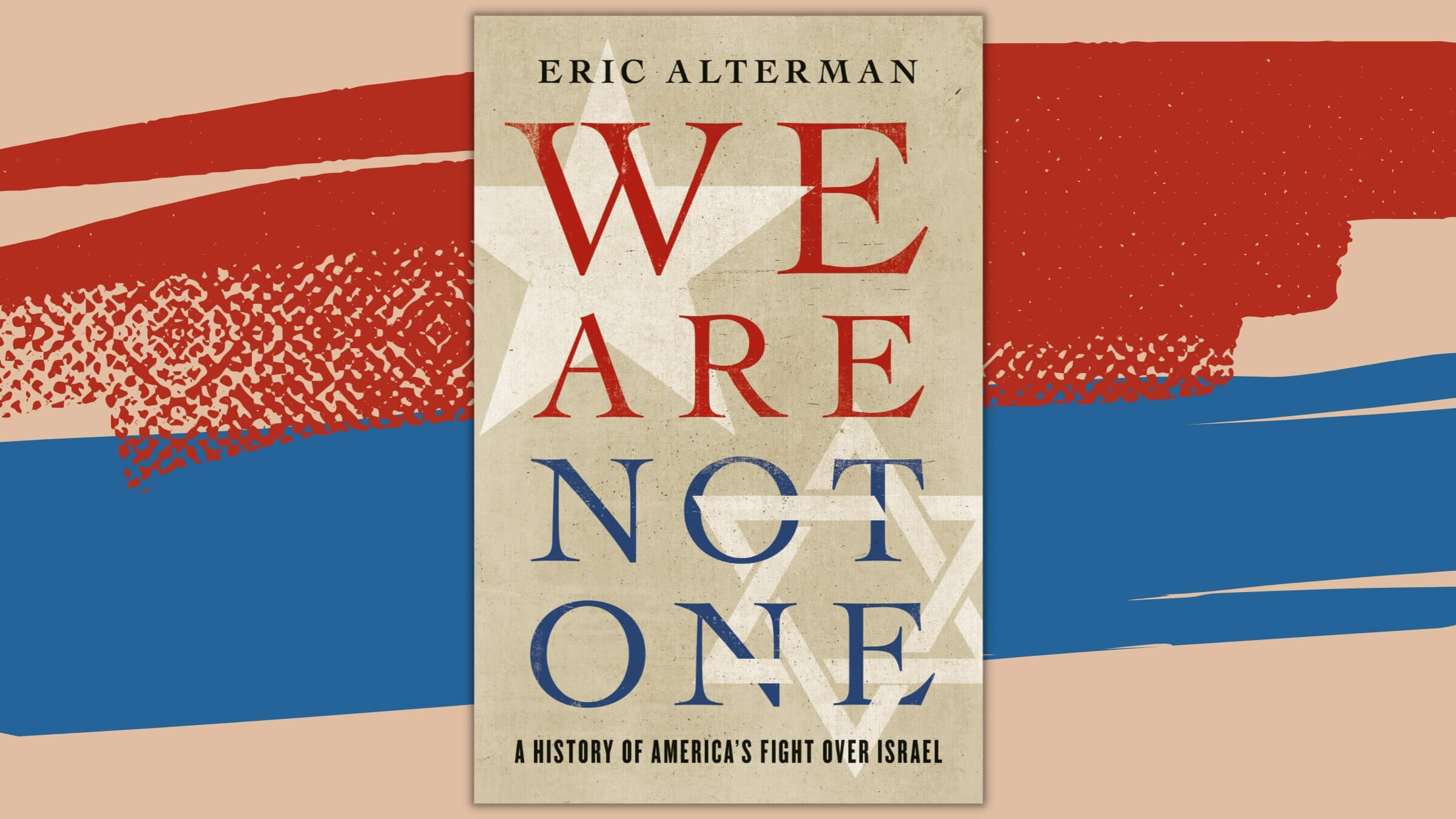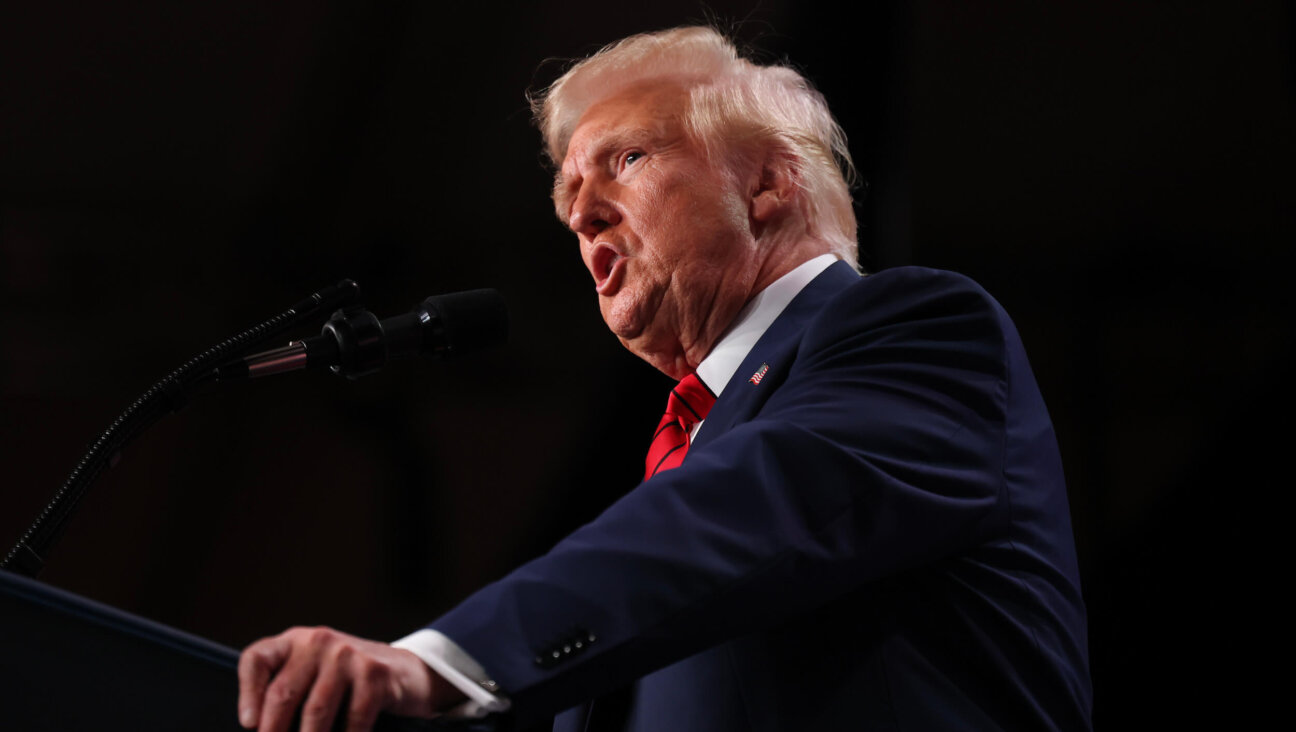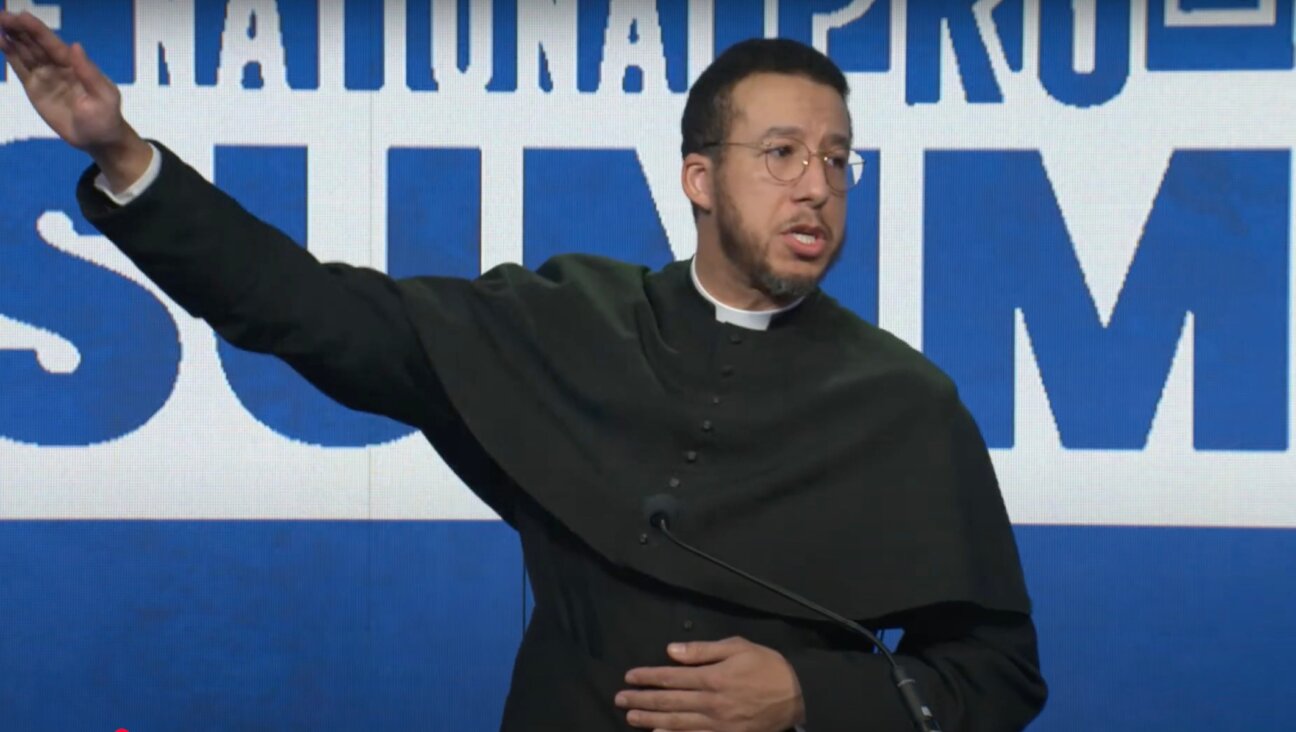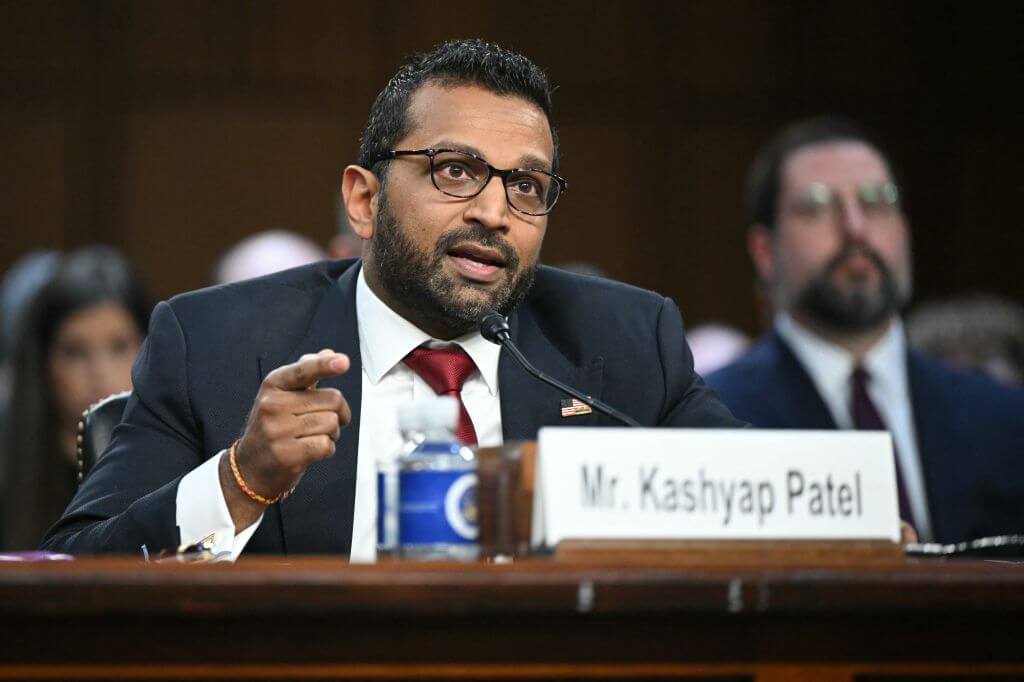‘There’s a real crisis in American Jewry’ — a new book warns of worsening deadlock in U.S.-Israel relationship
In ‘We Are Not One: A History of America’s Fight Over Israel’, the historian exposes uncomfortable truths about the two nations’ unique relationship

Eric Alterman explores the ties that bind Israel and the United States in his most recent book. Graphic by Matthew Litman
What it means to be an American Jew has long centered on two things: support for Israel and remembering the Holocaust.
But it hasn’t always been that way, historian and journalist Eric Alterman reminds us. In his latest book, We Are Not One: A History of America’s Fight Over Israel, he argues that American Jews’ initial comfort-from-a-distance with the Zionist state was transformed by the horrors of the Holocaust into “a guilt and gelt generation.”
In one particularly astonishing incident, he writes of an American congregation that sold its own synagogue building after the 1967 War and sent the proceeds to Israel, directly sacrificing its own communal needs for the Jewish state.
American Jewish institutions, he argues, have placed Israel on a pedestal, much to its — and our — detriment.
Repeated polls suggest that even American Jews who have a connection to Israel would like the U.S. to take a more critical stance toward its ally, yet the U.S. has largely allowed Israel to conduct itself as it pleases.
While these subjects are certainly not new, Alterman’s unflinching interrogation of the historical myths about the founding of the Jewish state and the U.S.-Israel relationship leaves no participant unspared. Reading Alterman’s relentless examination of U.S. financial support for Israel, the scrutiny Israel-related stories receive in American media, and the weaponization of antisemitism (even against liberal Zionists) in order to censor criticism, American Jews cannot help but be left with an uncomfortable feeling that their identity has been outsourced for political gain and spiritual diminishment, all for a small nation thousands of miles away.
Editor’s note: This interview has been edited for length and clarity.
What was the most surprising thing you learned while writing this book?
I’ve always considered the occupation to be a cancer, eating away at the things I loved about Israel. I thought I was going to write a book about how everything changed in 1967, when Israel began expanding into territories it captured during the Six-Day War. But in fact, Israel was never the country American Jews (and I) imagined it was.
Israeli Arabs lived under martial law through 1966. If they wanted to go from one village to another, they needed permission from local military authorities, whereas Israeli Jews could move freely on their side of the Green Line. The enormous difference in how Israeli Arabs and Jews were treated was baked in from the very first moment the state was created. In 1950, Israel passed a law expropriating all the property of the Arabs who had left. I can’t imagine how anyone could morally justify this.
The problem with telling this extraordinary story [of the U.S. relationship with Israel] is that there is so much that could sound antisemitic if one does not address all the caveats and complications that are necessary to tell the story correctly. That’s one reason I felt it needed to write a book, and not a short one.
After intensive lobbying from American Jews, in 1948, President Truman agreed to support the creation of the state of Israel. It felt like one of the few moments in the book where a politician really cared about human suffering, or specifically, the suffering of the Jewish people.
There were 250,000 or so refugees living in the functional equivalent of concentration camps after World War II had ended, and they had no place to go. The U.S. was never going to let them in. The British weren’t going to let them into Palestine. No country wanted them, and they needed a place to go. You needed a state of Israel for that purpose.
I could imagine other arrangements that would have made it possible to save those people. But the moral imperative of saving those people required having a state, and I think that was the main reason Harry Truman ended up supporting it. He really cared about those Jewish refugees in DP camps in Europe. He cared about those people, he cared about the Bible and he cared about Jewish votes.
The impression I got reading the book was that American Jews, and Israel, were political chips to be traded either for the Jewish vote or for oil, or as a regional bulkhead to conduct U.S. foreign policy.
There’s never been much concern with morality on the part of people who are making U.S. foreign policy. Politicians speak in moral terms and act on the basis of their own self-interest. They don’t have the slightest interest in democracy. It’s about access to markets, oil and strategic advantage.
Obama and Clinton and Carter are all very similar: They all wanted to do the right thing, as long as the price was something they wanted to pay.
President Obama writes in his post-presidential memoir A Promised Land that during his first term in office, [then-Deputy National Security Advisor] Ben Rhodes conveys to him that a “highly agitated liberal Democratic congressman” is very concerned about Obama’s opposition to the settlements.
“I thought he opposes settlements?” Obama asks.
“He does, but he also opposes us doing anything to actually stop them.”
It’s ironic: Israelis hate Obama, the American Jewish organizations hated Obama, and he still gave them basically everything they wanted. After he had that conversation with Rhodes, in his second term, Obama signed this unprecedented Memo of Understanding that gave Israel $38 billion over 10 years, and it’s a law.
You contend that American Jewish institutions, especially AIPAC, are not democratically representing what the majority of American Jews feel about Israel. Is the solution to have liberal left-wing Jews pour money into organizations like J Street?
Like everything else, it’s complicated. AIPAC is now not a lobby of American Jews. It’s a lobby of, quote unquote, “pro-Israel” supporters, whose positions are more consistent with Christian evangelicals than they are of American Jews. It’s funded by Christian evangelicals as well as American Jews. And it takes positions that are explicitly antithetical to the majority of American Jews, like supporting 109 insurrectionists in the midterms.
I think there’s a really useful analogy to make between the quote unquote, “pro-Israel lobby” and the NRA. Liberals care about a lot of things, but many Republicans are single-issue voters. That’s one reason that the NRA is so powerful: The people who oppose guns also support abortion and fight inequality and care about LGBTQ rights.
The people who attend the J Street convention also go to a lot of conventions and give money to a lot of causes. They spread their politics quite widely, whereas the hard-line pro-Israel folks don’t. They’re there all the time, and they’re making their demands every day, the same way the NRA does. That is one way to win is to stick around when everybody else has left, or is caring about something else.
The organizations that support the Israeli government and are antithetical to the views of American Jews will continue to hold the balance of power for a very long time.
The boundaries of what pro-Israel groups deem acceptable discourse on Israel are always shifting. Given the new Israeli government, will there be a tipping point in the unquestioning nature of American Jewish institutional support for Israel? I’m thinking of former ADL head Abe Foxman’s recent statement.
Foxman said, “I never thought I would reach that point where I would say that my support of Israel is conditional.”
You know, there’s always these generals, Israeli generals, and sometimes American generals, who see the light after they are no longer in power. The person who’s most responsible for AIPAC becoming the powerhouse organization that it is today, Tom Dine, is also in the camp of, “I can’t believe AIPAC is behaving the way it is. And I’m very depressed to see what Israel is.” But these figures don’t say these things while they’re in power.
In the early 20th century, American Jews loved the idea of a Zionist state for persecuted Jews, but not for themselves. Or as you called it, “Zionism for Thee, but Not for Me.”
American Jews were very excited about the founding of the state, and not at all thrilled to discuss going there. After the state was founded, American Jews kind of forgot about it. They occasionally had parades and planted trees and collected for JNF boxes, but until 1967, it didn’t loom at all large in the American Jewish imagination.
It was in 1967, during and after the Six-Day War, that Israel became for American Jews not merely an idea without flaw, but a place that was actually touched by God. Reform and Conservative rabbis began talking about Israel as if it were a literal, God-given miracle even though they never really talked about God in this way before. This story of Israel’s infallibility was something that was embraced by American Jews who didn’t really like to be a secular American Jew before this.
Something else that really struck me about the book was your exploration of the concept of dual loyalty.
I was raised to be dual loyal. I was specifically instructed by my grandparents that I had better defend Israel and America. Some American Jews believe that America and Israel are really the same thing. So there’s literally no contradiction between supporting Israel and supporting America.
That’s clearly ridiculous, because Israel is not a global superpower, it’s this tiny little country in the Middle East surrounded by hostile nations. And it’s not a liberal democracy, it’s something else. America is a superpower with lots of different interests.
Until recently, this difference between the two nations has been denied. The official line, on both the left and the right, was that America and Israel were the same. The left said Israel is the spearhead of American imperialism in the West, something Edward Said would sign onto, and the right said Israel was defending American democracy in the Middle East.
AIPAC CEO Howard Kohr was asked recently: ‘Is there anything an American politician could do who supported Israel that would lead you not to support him?” He said, “I’d have to think about that.”
If an American politician can destroy democracy on purpose, can support Jan. 6, and a pro-Israel organization can support him regardless, well, what would you call that?
On the other side of responses to Israel is the movement to boycott, divest from, and sanction Israel. BDS is continually invoked as a boogeyman by American Jewish institutions. “It’s taking over college campuses!”
I don’t like BDS. I don’t like the idea of boycotting Jews because of the history of that kind of boycott. But if I thought BDS would end the occupation, I would support it because I would support almost anything that would save Israel from the consequences of the occupation that I think is destroying what was so valuable about it. But there’s no way BDS can end it.
The politics of BDS is a perfect metaphor for everything about the debate around Israel and Palestine. It’s entirely performative. It has no basis in actual reality, but it speaks to people’s emotions, it speaks to people’s identities, and so it gets really nasty.
The disparate Palestinian constituencies are impossible to satisfy simultaneously. So the only thing they can all agree on is “no.” There should be “no” to all kinds of compromises, and there should be some form of resistance. Today that form of resistance is BDS, which is something Israel can live with very pleasantly.
What does the future look like for American Jewry?
For 55 years, to be a Diaspora Jew meant to celebrate Israel and remember the Holocaust. And that doesn’t work anymore.
That vision of Judaism is what is costing the Conservative movement 33% of its membership over the past 15 years or so; in the Reform Movement, 18% of its membership.
There’s a real crisis in American Jewry. And there are a lot of reasons for it. But I think a very big one is the inability to relate to a Judaism that is being sold by the American Jewish community organizations.
Birthright has contributed billions to the Israeli economy, and a great portion of it has gone to the Israeli military. This gesture says to American Jews, “We want you to be Jewish. Go to Israel and learn how to be Jewish.” I think that’s a terrible mistake.
What we need is an investment of time and money and thought to reimagine what it means to be an American Jew. Even if you think everything Israel’s doing is wonderful, and has never made any mistakes, they’re a very different country living a very, very different experience than we are. This idea of living through them does not work.
Eric Alterman is an award-winning journalist and historian and a CUNY Distinguished Professor of English at Brooklyn College. He earned a Ph.D in U.S. history from Stanford University with a minor in Jewish Studies. We Are Not One: A History of America’s Fight Over Israel is his 12th book.
A message from our Publisher & CEO Rachel Fishman Feddersen

I hope you appreciated this article. Before you go, I’d like to ask you to please support the Forward’s award-winning, nonprofit journalism so that we can be prepared for whatever news 2025 brings.
At a time when other newsrooms are closing or cutting back, the Forward has removed its paywall and invested additional resources to report on the ground from Israel and around the U.S. on the impact of the war, rising antisemitism and polarized discourse.
Readers like you make it all possible. Support our work by becoming a Forward Member and connect with our journalism and your community.
— Rachel Fishman Feddersen, Publisher and CEO
























